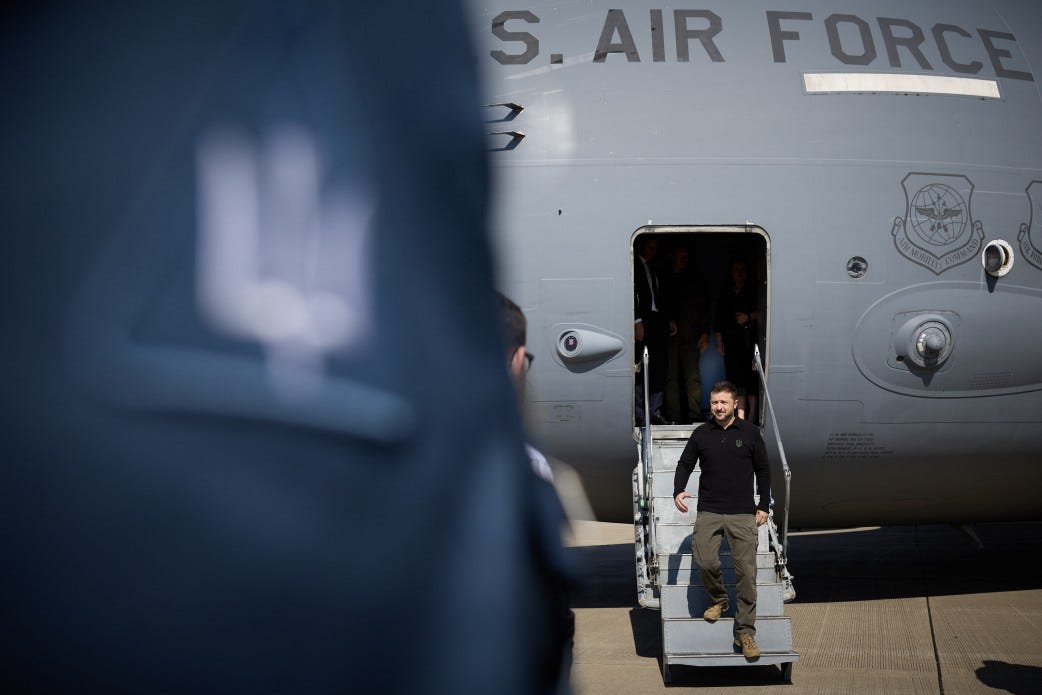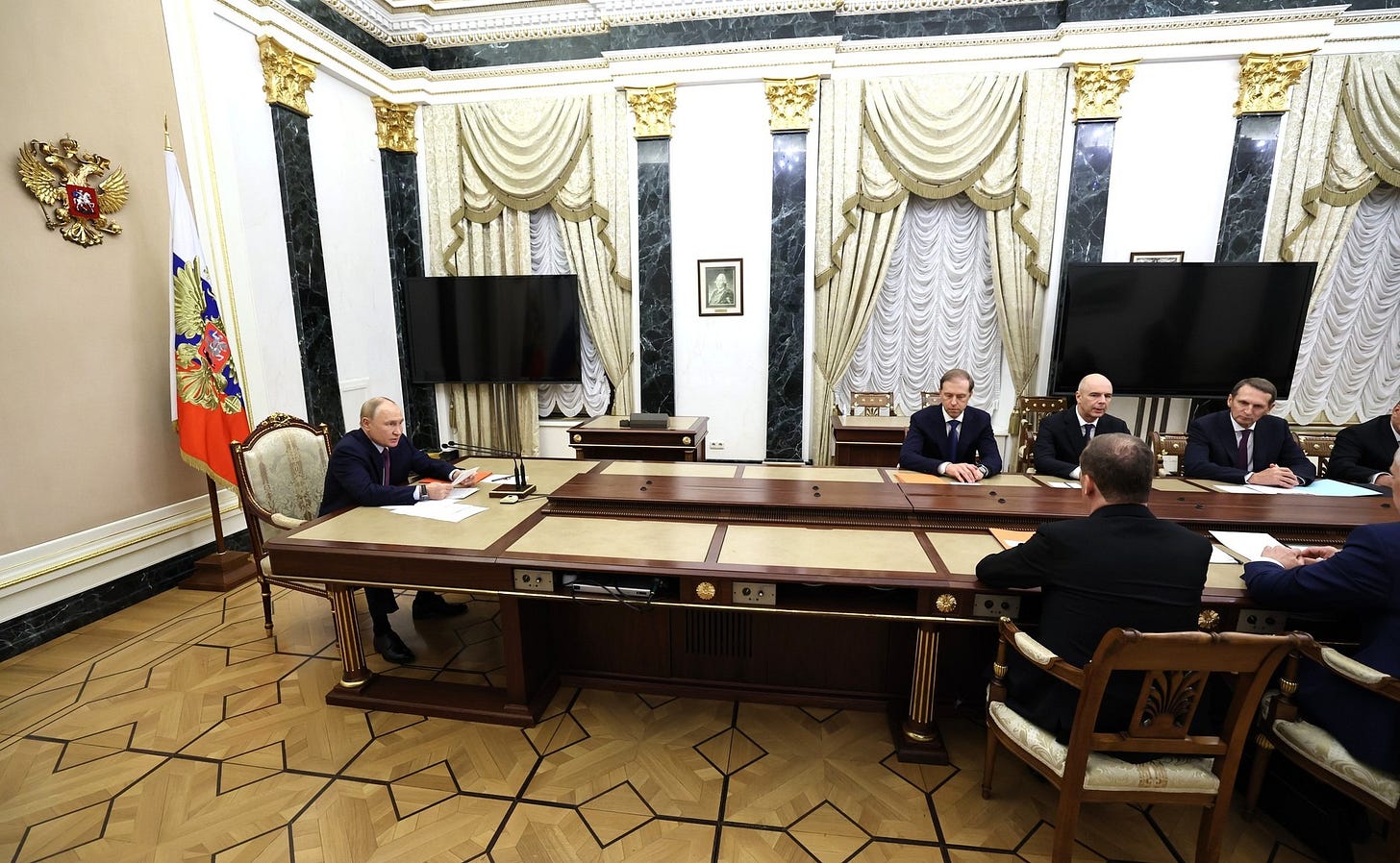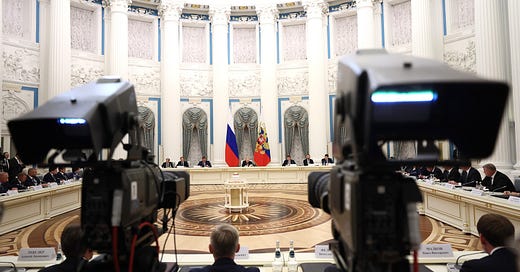Russian Elite Expects Ukraine War to Escalate, Not Die Down
Putin's entourage increasingly sees peace talks as a distant prospect, believing Ukraine’s seizure of territory in Kursk region has been a big blow to Putin’s self-regard.
Dear subscribers, since the beginning of the war in Ukraine we have very limited options to earn money for our work. You can help our small team keep doing independent journalism supporting us on PayPal or Patreon.
Those close to Russian President Vladimir Putin do not expect the war in Ukraine to end anytime soon, according to multiple sources in the upper echelons of the Russian government. The Russian elite increasingly sees peace talks as a distant prospect, believing Ukraine’s seizure of territory in Kursk region has been a big blow to Putin’s self-regard.
“It’s all gone too far. I don’t believe there will be any sort of peace process. Nothing will stop until Ukraine collapses,” said the head of a large state-owned company in Russia who is in regular contact with Putin.
The darkening of the mood in Moscow comes as Russian forces continue with a bloody offensive in eastern Ukraine. While territorial gains have come at a high cost, Russia recently seized the strategic town of Vuhledar, which has been the scene of intense fighting since the start of the full-scale invasion in 2022.
Those who support peace talks with Ukraine in the Russian elite are now very much in the minority, according to sources. Before the attack on Kursk region, there was greater support for negotiations, said one official who is under Western sanctions. “It’s difficult now even to mention the idea of peace—anyone saying such a thing will be made to shut up,” he added.
According to another official who meets regularly with Putin, the chance of peace talks would diminish even further if the West gives permission for Kyiv to launch long-range Western missiles at Russian territory—something Ukrainian President Volodymyr Zelensky is seeking. “This would be a big escalation,” he said.

The increasingly pessimistic outlook among officials in Russia follows a summer of hope that some sort of peace settlement could be achieved. In particular, our sources pointed to three developments earlier this year.
Firstly, a softening of the rhetoric coming out of Kyiv. For example, in July Zelensky spoke about the possibility of a referendum to decide the terms on which the war could end. “He didn’t talk about ‘not giving an inch’ or something similar,” said one source. Secondly, the large prisoner swap involving Russia, U.S. and European countries increased trust between Russia and the West.
Finally, the Russian and Ukrainian militaries were close to reaching a deal in which both sides would stop attacking the other’s energy infrastructure. The plan was to ink a deal in Qatar on 22 August or 23 August at the first meeting between Russian and Ukrainian generals since the full-scale invasion.
“It would have been a win-win situation,” said a source close to those involved in the negotiations. “Between 15 percent and 20 percent of Russia’s oil refining capacity had been knocked out and winter was bearing down on both sides.” According to him, there were also other proposals for de-escalation on the table, including an agreement not to use some particularly destructive types of weapons, and limit strikes to a certain distance from the frontlines.
The Washington Post reported the putative agreement was abandoned because of Ukraine’s attack on Kursk region. Publicly, both sides have denied there were any talks.
Zelensky subsequently stated in an interview that the Kursk operation had “shown a very important truth to the Russians… how Putin did not run to defend his own land.” And Putin was apparently deeply angered by the attack. “It was humiliating for Putin,” said one of the president’s acquaintances.

Putin only commented in detail about events in Kursk six days after the Ukrainian attack when he launched a tirade against Zelenksy, accusing him of trying to destabilize the situation inside Russia. Putin now believes Ukraine used the negotiations for the Qatar deal as cover for its Kursk operation, according to our sources.
“The Kremlin has come to a corresponding conclusion that they will destroy Ukrainian statehood. The situation looks like it will end up in no-rules warfare and both sides are considering how to make things harder for the other,” said the source. According to him, there is no chance Putin would consider swapping land in Kursk controlled by Kyiv for Russian-held territory in eastern Ukraine.
Putin last month responded to Ukraine’s repeated requests to Washington to be allowed to use Western weapons inside Russia by threatening to change Russia’s nuclear doctrine to lower the threshold for nuclear weapon use. However, another of our sources who meets regularly with Putin believes the Russian president would only risk using nuclear weapons if Russia got involved in a full-scale war with the West. For the moment, Putin is held back by the necessity of preserving good relations with the Global South.
A waning appetite for talks in Moscow comes as the possibility of peace negotiations is increasingly raised by Ukraine’s Western backers. German Chancellor Olaf Scholz last month floated the idea of talks, and said he was intending to phone Russian President Vladimir Putin for the first time in two years. Czech Republic Petr Pavel, a former NATO general, has suggested Ukraine should make territorial concessions. There is no sign, however, that Kyiv is looking for a negotiated settlement. For example, Zelensky told the United Nations last month that Russia must be forced to make peace—and the only way to achieve that would be for Putin to lose on the battlefield.
At least in Moscow, officials seem to be planning for a long war. The recently-announced state budget for 2025-2027 envisages a record level of military spending. Next year, Russia plans to spend 13.5 trillion rubles ($142 billion) on the military. That’s about 6 percent of GDP—higher than in the U.S., and most European countries. Since the start of the war, the Kremlin has more than tripled spending on the armed forces, which, along with spending on the security services, now amounts to about 40 percent of the total budget.
At the same time, Russia is experiencing an economic boom. Defense spending has boosted economic growth, and real incomes are rising. The U.S. and its allies have been unable to deprive the Kremlin of one of its main sources of income—the sale of oil and gas. According to Russia’s Finance Ministry, oil-and-gas sales have risen 56 percent so far this year.
Apparently, the Kremlin is planning to fight on for a long time—or at least wants the capacity to do so. One of our sources said that, while Ukraine’s Kursk operation was a tactical success, it will be difficult for Kyiv to convert that into strategic gains. “Ukraine’s forces are being exhausted,” he said. “The Kremlin can carry on waging war like it is at the moment for decades.”
Translated and edited by Howard Amos





Ruzzian propaganda gargabe piece written to impress western audiences that "russia is prepared for a long fight."
This was all completely unpredictable in 2022. Russia has now decided it has maximalist goals because, well, that's just how things worked out. Of course, this is very "dark" and "pessimistic" for Russia.